The time barrel was first mentioned in an article I wrote about background listening a while back. I needed a metaphor to explain how it was possible to listen to Chinese a lot without actually spending that much extra time.
Most people have jobs, some study other things and only a few of us study Chinese full-time. Now, it’s only natural that someone who studies full time can learn more, but it’s very likely that you have more room for Chinese than you think.
The basic formula is very simple:
- Examine your daily activities and see what kind of time you have available
- Find ways of studying which fit the time you have available
Important: Time management is about doing what you want to do with your time, it’s not only about getting rid of things that aren’t “useful” and which don’t take you towards your goal of learning Chinese. Managing your time is useful whatever your goal is. If you lead a busy life and want to learn Chinese too, that’s fine. If you have all the free time in the world, but want to play computer games as much as possible, time management is still useful. In other words, in the following discussion, I don’t really care about what the tasks are, as long as they are tasks you want to complete, for whatever reason.
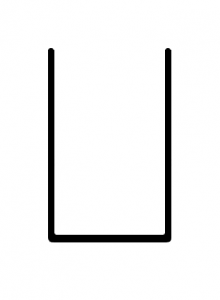 The time barrel
The time barrel
To show how I think about time management and studying, allow me to introduce the time barrel. It doesn’t look like much right now, it’s just a container. However, before we talk about what we can fill the container with, we need to talk about the container itself.
The barrel represents all 24 hours in one day
The barrel represents all time you could theoretically use, i.e. all 24 hours in one day. Naturally, you can’t use all this time for studying, but I want to make it clear that the barrel still represents all 24 hours, including the time you usually sleep, work, eat and so on.
Regardless of how much you try, you can never change the length of one day and neither can you change the size of the barrel. We can change what we put in it though.
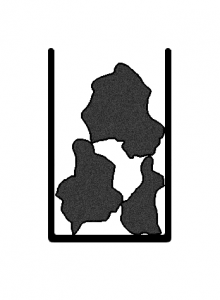 The rocks represent major tasks that can’t be interfered with
The rocks represent major tasks that can’t be interfered with
Most of us have things in life which we either must do to survive or that we consider so important that we have to do them. The first and most important one is sleeping, because no matter what we do, we need to sleep.
If you’re close to the average of 8 hours sleep per day, your barrel will be contain one big rock representing those eight hours.
If you have weird sleeping patterns, like sleeping less during the night and making up the deficit with power naps, you’ll have smaller rocks that are more flexible.
Apart from sleeping, there might be other things we have to do, like working, eating and maintaining contact with friends and family. Rather than regarding these as big lumps of rock, I think most of them can be considered to be pebbles (see below), so instead of regarding eating as a block two hours long, we can regard it as many smaller pebbles.
Depending on what kind of job you have, the same will be true there. A teacher has lessons and meetings he has to attend to, but that hardly fills up eight hours per day. The total work time might still exceed eight hours, but it’s not one big lump for teachers.
Going to class is of course also represented by rocks, regardless of what you’re studying (Chinese or something else). I have simplified the situation a bit and just drawn a few rocks, but as we can see, the barrel is already getting full!
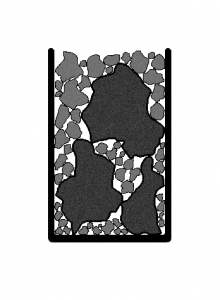 We still have room for pebbles
We still have room for pebbles
Now, this is where most people stop and say “I sleep for eight hours, I work for eight hours, it takes two hours to cook and eat, I have to maintain contact with friends and exercise, so there is no time left for language learning!” This is obviously not the case, there is still room for pebbles.
If rocks represented big, bulky tasks, pebbles represent smaller tasks we can move about more freely. Of course, there’s no fixed definition of what a pebble is and what a rock is, but let’s say a rock is something which takes several hours to complete whereas a pebble only takes ten minutes. Now, even though our day looked full, we can see that it’s still possible to fill it with a whole lot of pebbles. Here are some tasks that can be considered to be pebbles:
- Reading a Chinese book before going to bed
- Looking up a few characters that’s been troubling you recently
- Finding new audio to listen to
- Moving audio to your mobile phone
- Posting a question on a language forum
- Writing a few sentences on Lang-8
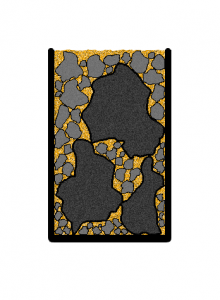 Now it’s really starting to look full…
Now it’s really starting to look full…
…and yet there is still room for sand that trickles down between the pebbles and fills the spaces you didn’t know where there. This is the kind of studying you only do for a few seconds up to several minutes each time, but that accumulates over time to become a significant factor. There aren’t many tasks that are suitably represented by sand, but there are a few that are possible because of modern technology:
- Reviewing vocabulary using spaced repetition software on your smart phone
- Listening to a few minutes of audio on your mp3 player
- Review tricky characters you have written on your hands
- Chatting with a friend in Chinese
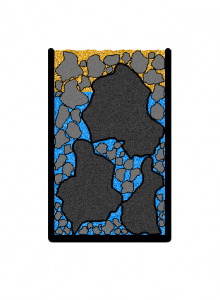 The barrel is full!
The barrel is full!
Or is it? If you have a barrel full of rocks, pebbles and sand, it certainly looks very full. Not a single grain of sand can be added, let alone pebbles or rocks. Still, it’s possible to add several litres of water to such a barrel without it overflowing. Water fills the spaced we didn’t know existed, it superimposes itself over the other things in the barrel. This means that there are very few things indeed that can be represented by that water, but here are a few examples:
- Background listening can be done at the same time as almost anything else
- Switch your computer/phone interfaces to Chinese
- Convert habits or hobbies into Chinese (sports in Chinese, play games in Chinese)
No metaphor is perfect
This is just one way of looking at time management and because it is a metaphor, it is also flawed. It will highlight some things I find important (the fact that we have more time than we think and that we need to find ways to study that fit in our time barrels), but it will also miss some things. For instance, this metaphor isn’t good to explain the fact that you can do many things at the same time. Listening to Chinese while doing the laundry would have to be water superimposed on rock, which isn’t neat at all. Still, I hope I have been able to show that you don’t need one three-hour block of free time per day to study three hours.
Be dynamic and flexible in your endeavour to learn Chinese, be on the lookout for ways to fit Chinese into your day that doesn’t interfere too much with the other important things you do in your life!

16 comments
I like your metaphor. Think I have seen this done in a science class….but not for time management….can’t even remember what the purpose of the demonstration was for…
Anyway I too have just started a new way to manage my study time. Very simple and it works for me and makes my study more productive.
Called Pomodoro Technique http://www.pomodorotechnique.com/
Very easy to use. 25 minutes study / focus time 5 minutes off…rinse and repeat.
Loads of times available too.
I use this one http://www.pomodoro.me/
Similar Apps on iPad and Android too.
This sort of chunking of short periods of time makes learning tasks less onerous.
You could think of doing the laundry or tooth brushing as necessary but porous kinds of rock.
I do like this, and have seen it before. But it can also be thought of the other way round. If you don’t put the rocks in first, you won’t get them in later on. Time management is about prioritisation, and if things are important to you, they have to be prioritised, no matter how bit and horrible they seem!
If anyone is interested, I have tried to roughly quantify the time barrel method, to assess how efficient it is to allow me to study Chinese during one of my typical working days.
You can see the results in my blog: http://how-to-learn-any-language.com/forum/forum_posts.asp?TID=35497&PN=2&TPN=41
Check the post dated 21 October.
Very interesting, thanks for sharing!
I love your metaphor! I had a vague idea of this concept, but you put it in words (and pictures) beautifully!